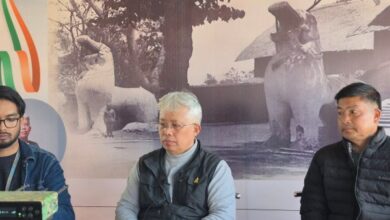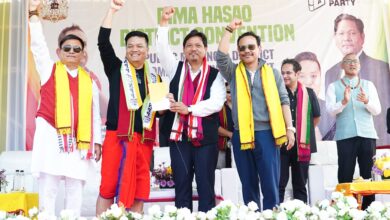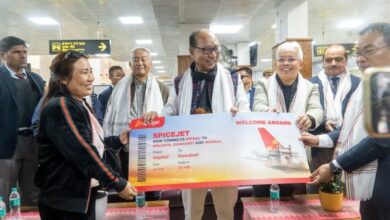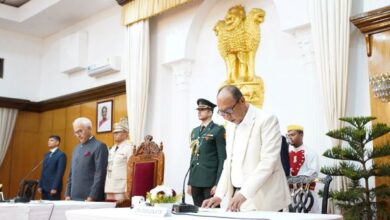North East Catholic Research Forum against Arunachal Act

Shillong, Feb 13: The North East Catholic Research Forum based in Guwahati has objected to the revival of the Arunachal Pradesh Freedom of Religion Act, 1978.
In a memorandum addressed to Arunachal Pradesh Chief Minister Pema Khandu, the Forum, a non-partisan organization dedicated to upholding constitutional liberties, social justice, democratic integrity, social harmony, and peace, expressed opposition to the proposed revival of the Arunachal Pradesh Freedom of Religion Act, 1978.
“We feel that the revival of this Act, which remained dormant for 47 years, would vitiate the peaceful atmosphere in the state of Arunachal Pradesh”, it said.
The reasons cited by the Forum below
1. Article 25 guarantees the right to freely profess, practice, and propagate religion. This
Act, however, aims to restrict this constitutional safeguard through vague and
sweeping definitions of “forced conversion” and empowers the state administrative
machinery to infringe upon liberty and privacy in choosing one’s faith by making it
mandatory to submit reports on so-called conversions. This amounts to nullifying the
constitutional right to liberty guaranteed under Article 21 of the Constitution.
2. Article 14 of the constitution guarantees equality before the law. But under Section
5(1) of the Arunachal Pradesh Freedom of Religion Act 1978, targeting religious
minorities is encouraged on the pretext of anti-conversion. The law, however, is silent
on attempts to reconvert by powerful religious and political groups in the name of Ghar
Wapasi.
3. In the Shafin Jahan vs. Asokan K.M. (2018) case, the Supreme Court reaffirmed that
an adult’s right to choose their religion is an absolute individual right, superseding
family, societal, or state interests. In this Act, there is a clear attempt to deprive
individuals from choosing a religion of their choice, which is egregiously incompatible
with the spirit of the Indian constitution.
4. There are elements at work, aiming to create differences between different religious
groups in this country, and taking cue from them, divisive forces in this region are also
trying to fuel inter-religious frictions, instigating tribal groups to discourage
individuals from choosing religion of their choice. There are also groups habitually
indulging in Christians bashing, charging them with false allegations of eroding tribal
culture, language, and tradition. These groups even demand delisting of tribal
Christians from the list of Scheduled Tribes of the country.
“Arunachal Pradesh has, historically, been a model of peace and coexistence. Unlike other
Northeast states plagued by insurgency, Arunachal Pradesh remained largely untouched by this contagious menace, except in some parts of the state’s eastern region”, the memorandum said.
“Despite the diversity, the state is never known for ethnic violence. In other words, the state exemplifies harmonious inter-religious coexistence, where every religion enjoys the freedom to practise their respective
faiths freely. What the Arunachal Pradesh Freedom of Religion Act aims at is to curtail this freedom, which is against the spirit of the constitution of India”, the Forum said.
“Arunachal Pradesh is also one of the states with an impressive literacy rate (82.92%) and GDP growth rate of 14.56%. This trajectory has been possible because of stability, inclusivity, and excellent governance. Adopting legislation that has the potential to divide its people along religious lines would only discourage investors, civil society, and international development agencies for fear of possible social disturbance and curtailment of human and fundamental rights. States that have passed or enforced similar laws—Madhya Pradesh, Uttar Pradesh, and
Chhattisgarh—have seen international development aid shrink, human rights indices fall, and communal tensions rise”, the Forum added.
“Sir, we may also remind you that your late father, Shri Dorjee Khandu ji, who was one of the architects of new Arunachal Pradesh, did not deliver by appeasing divisive forces, but through his commitment to a peaceful and progressive Arunachal Pradesh. Your government, under your esteemed leadership, therefore has the opportunity to demonstrate courage, reject sectarian politics, and uphold constitutional values, in order to ensure that the state further move up the ladder of development”, the memorandum said.
Last but not the least, supporters of this Act may argue that such a law was needed to protect tribal customs and traditions. However, tribal traditions are best safeguarded through affirmative policies,
tribal empowerment, and sustainable development plans, and not through coercive laws that would create mistrust among the citizens. Furthermore, by reviving this law, your government risks playing into the hands of sectarian forces that seek to destabilize indigenous harmony. Arunachal’s indigenous communities, rich in diverse traditions, have maintained inter-religious and inter-tribal cohesion and stood the test of time. Tampering with this rich heritage shall be a grave injustice.We, therefore, humbly urge you and your government, not to revive the Arunachal Pradesh Freedom of Religion Act, 1978″, the Forum added.





